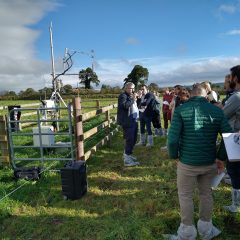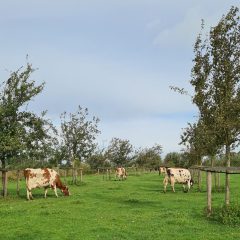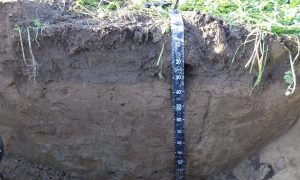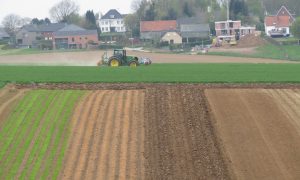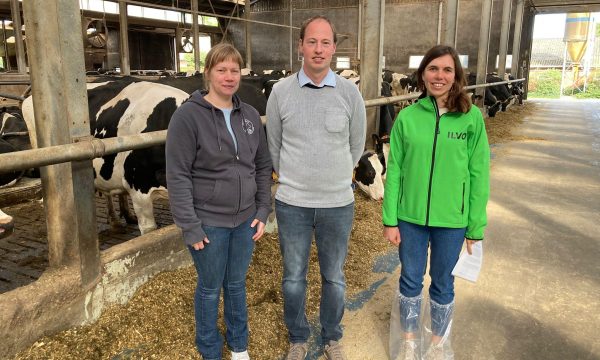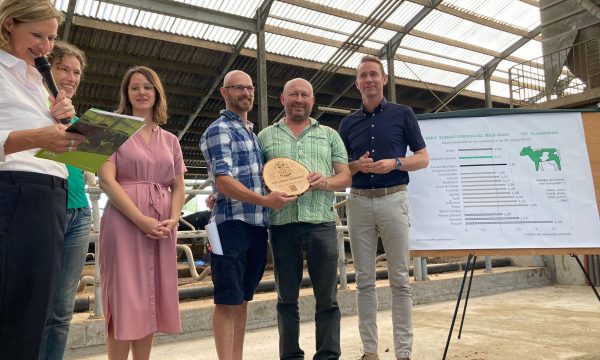Theme Toward climate-smart agriculture and food production
The ILVO Center of Expertise for Agriculture and Climate is committed to a food chain that is environmentally friendly, climate-robust and profitable. Special attention is paid to closing loops, limiting losses throughout the chain, efficient use of natural resources, carbon storage, sustainable consumption patterns and limiting the impact of animal production.
ILVO Expertisecentrum Landbouw & Klimaat (NL)Quick links
With our knowledge we try to reduce the impact of agriculture on the climate (mitigation) and we try to adapt agriculture to the consequences of the climate crisis (adaptation). In doing so, we always keep the broader sustainability of the agri-food chain in mind.
Holistic approach
The Center of Expertise for Agriculture and Climate was created in late 2016 to support and advise agricultural policy and the broader agricultural sector. We bring together diverse climate research, identify gaps and initiate new research. Because we closely follow international agricultural and climate research, we can place the Flemish situation in a European and global perspective.
An important asset of ILVO is the holistic way in which we approach issues related to agriculture and climate. To this end, we use our multidisciplinary knowledge and our expertise in systems thinking. Via life cycle analysis (LCA), we also calculate the total environmental impact of an agricultural product, from raw material to end product. In this way we map out possible problem shifts and avoid a situation where a lower emission in Flanders or in one link of the production chain creates an increase in another link or in another part of the world
Climate scan for more insight
The evolution towards climate-friendly and climate-robust farming is a challenge for every farmer. To meet this challenge, farmers first of all need insight into the main causes of greenhouse gas and other emissions on their farms. In addition, they need to know what impact climate change will have on their farm. ILVO is working with partners to develop an LCA-based climate scan that will provide them with these insights. Subsequently, we want to map out a path of relevant climate measures with the farmer, tailored to the individual farm. We ensure that these measures are practical and economically feasible and we map out any side effects for the farm or the environment. In this way we take all aspects of sustainability into account. In time, together with our partners, we want to roll out the climate scan for all sectors in the agri-food industry.
Animal emissions
Cattle and other ruminants are the largest source of emissions in the agricultural sector, because their digestion releases methane. A great deal of ILVO’s climate research is therefore aimed at reducing methane emissions from cattle, primarily through ration adjustments. Through the Flemish Covenant on Enteric Emissions, in which ILVO plays a leading role, we are taking steps to implement methane-reducing measures from the research in practice. We also devote attention to the reduction of other emissions, again through a systems approach.
Energy consumption
In greenhouse horticulture, energy consumption is the most important climate-related issue. To help reduce that consumption, we improve existing systems, such as lighting systems, and develop new technologies, such as a vapor heat pump. This type of pump converts plant vapor into heat. When used in combination with energy-saving screens, it can significantly reduce energy demand. We are also looking at how growers can apply successful lowcarbon innovations by co-creating with relevant stakeholders. In addition, we pay attention to increasing sustainability further down the chain, because the processing of primary products also requires a lot of energy. By expanding a sensor network within the Food Pilot, our semi-industrial food processing plant, we aim to map out the energy consumption during the various processing phases and techniques. This is a pioneering role.
Reducing water consumption
Agriculture is vulnerable to the effects of global warming, such as heat, drought, heavy rains that cause erosion, as well as the emergence of new diseases and pests. In a relatively new water research program, ILVO has a two-pronged focus: strategies to reduce water demand from agriculture as well as ways to increase the water supply. For example, the demand for water can be reduced by more efficient irrigation, but also by opting for drought-tolerant crops and even for climate-resistant systems, such as saline agriculture or agroforestry. To increase the water supply, we want to literally give water more space again: infiltration, buffering and reuse are all important for this.
Smart carbon management
Agricultural soils contain soil organic matter and can therefore capture and store CO2 for a long time. ILVO has extensive knowledge about ways to increase the carbon content in the soil, for example through adapted crop rotations and cultivation systems or the use of organic fertilizers and soil improvers. Some of these techniques also allow farmers to save on mineral fertilizer. In our research, we also pay attention to so-called trade-off effects of carbon-increasing measures, such as nitrous oxide emissions from the soil and nitrate leaching, and to co-benefits, such as water storage and biodiversity
Farmers that make an effort for the climate also need to see those efforts getting validated. That is why we are helping to develop an adequate carbon monitoring and compensation system. In addition to increasing the carbon storage under agricultural soils, we also want to better protect existing ‘carbon hotspots’, such as peat-rich areas and old grasslands.
Closing loops as a way of thinking
Closing loops is becoming increasingly important in agriculture. This means, among other things, that biomass must be optimally valorized. This can be done, for example, by linking plant and animal production chains in a smart way, so that by-products from the agricultural and food industries can be used as animal feed. In that context ILVO also wants to increase appreciation for the role of grasslands and ruminants. In places where only grass can grow, ruminants play a crucial role in circular agriculture. They eat grass, which is not digestible for humans, and convert it into high-quality protein and manure. This manure maintains the fertility of other fields so that field crops and vegetables can grow there. In this way, livestock farming also makes a small contribution to a climate-smart agricultural and food sector.
